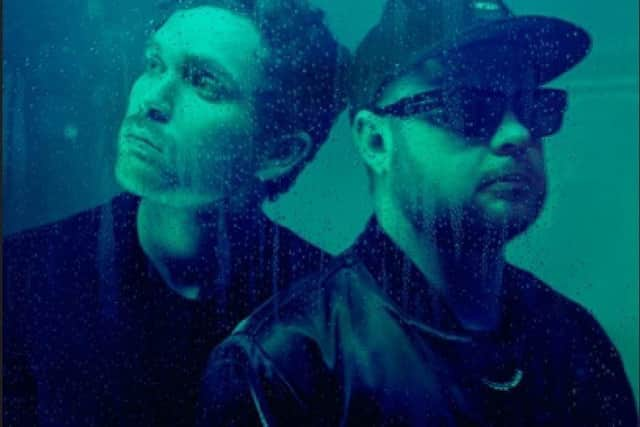Aidan Smith: Royal Blood made prats of themselves in Dundee and should know that Scottish crowds have always been tough
“We are Royal Blood and this is rock music,” declares singer Mike Kerr at the Radio 1 Big Weekend in Dundee, before adding sarcastically: “You do like rock music, don’t you?”
Kerr quantifies the crowd’s response: “Nine people - brilliant.” He introduces the drummer and there’s what he regards as a similarly underwhelming reaction. “We’ll clap ourselves,” he harrumphs, “because that was so pathetic.”
Advertisement
Hide AdAdvertisement
Hide AdThe frontman tries again, challenging fans at the side of the stage: “Will you clap us? Are you too busy? … Yes, he’s clapping.” Then addressing the sea of people out front: “What does that say about the rest of you?” The set ends with Kerr dropping his guitar and stomping off stage holding two middle fingers aloft.


Royal Blood have been ridiculed on social media for this hissyfit, with the Twitterati pointing out that no matter how big a band get, they’re never better than the audience, and that affirmation shouldn’t be expected but earned.
Of course a lot of the tweets have been funny, such as this from Alice May Dear: “Eight-year-old me storming out of the living-room because my family were talking during my performance of the Spice Girls ‘Wannabe’.”
A snap of snoozing pensioners is captioned “The Royal Blood moshpit.” As the English act are deemed posh with “Waitrose accents”, the nine who showed their appreciation in Dundee are revealed to be the tailcoated elite of the Bullingdon Club.
Royal Blood may never live down the bombast of “ … and this is rock music”. They’re a duo so memes have the pronouncement attributed to cosying-up GB News foghorns Eamonn Holmes and Dan Wooton as well as proper comedy double-acts including Reeves and Mortimer at their most insane, a bare-chested Little and Large and Fathers Ted and Dougal warbling the Irish Eurovision entry “My Lovely Horse”.
All of this is a good laugh but pouring so much scorn on the band does neglect a vital aspect of the affair. This was a Scottish audience. Now, pomposity and presumptuousness should always be punctured but here there is a long and fine tradition of crowds being - euphemism alert - tough. And not just hard-to-please but - arms tightly crossed, faces of stone - demanding to be entertained. Woe betide performers who arrive massively hyped by metropolitan tastemakers or who assume that in the frozen north we don’t get out much, lack critical discernment, so will gladly lap up any old bilge.
Sheena Easton thought any old American accent would do when she took to the stage at Glasgow’s Big Day, a highlight of the city’s 1990 reign as European City of Culture. She’d achieved considerable US success - fair enough - but in tones more Bel-Air than Bellshill seemed to have forgotten where she’d come from. Easton was booed and had to dodge a barrage of bottles.
Throughout showbiz history, traumatised troupers have recalled with a shudder the “Glasgow graveyard” and nights at the mercy of the baying mob - or just as bad, the mob which administers the silent treatment.
Advertisement
Hide AdAdvertisement
Hide AdDuring variety’s 1950s heyday the Empire Theatre stood mausoleum-proud. The punters were epicly unimpressed when Mike and Bernie Winters - billed as an up-and-coming comedy double-act which is something telly audiences might contend was never achieved - began their routine with the former parping on a clarinet. When he’d finished, Bernie, the really glaikit one, popped his head through the curtains and before a train timetable could be checked for the last sleeper out of Central Station, the anguished cry rang out: “Christ, there’s two o’ them!”
Shirley Bassey and Des O’Connor were also up-and-coming at the Empire. Bassey looked on in horror from the wings as a human pyramid act was booed, causing the acrobats to crash to the floor. She was next up and suffered the same treatment. Halting mid-song, she challenged the crowd: “If you don’t want to be entertained then I’ll bloody well go home but at least give me a try.” Her ballsy attitude won them over.
O’Connor fainted during his debut. In legend, he faked it to get off the stage where, in a theatrical sense, he’d been “dying”. The story was told differently in the memoirs, the panic attack brought on by the grumpy audience being real enough, with the musical director enquiring of the prostrate entertainer: “Son, is this in the act?” O’Connor realised he had a stark choice: give up or try again. “The next time,” he wrote, “someone weakened and gave me a laugh.”
In the 1960s Scottish crowds could be just as terrifying for rock ’n’ rollers. In his autobiography Keith Richards described a Rolling Stones gig in Hamilton where the band performed behind a chicken wire fence patrolled by fierce dogs - “because of all the sharpened pennies and beer bottles flung by the guys who didn’t like their chicks screaming at us”.
And when the Stones played Blackpool they couldn’t quite escape Glasgow because during the latter’s trades holiday a “rabble army of Scotch drunks” descended on the seaside town. Richards rated the show at the Empress Ballroom, as it unfolded, as no less “hairy” as Altamont. It was when murder was discovered that the Californian gig would become rock’s most-notorious.
Royal Blood, then, got off extremely lightly. How prissy, entitled and silly they seem, simply because a festival crowd - not exclusively their own fans - offered a less-than-ecstatic critique. A pity they didn’t see the clips from Edinburgh the previous night as Harry Styles proved himself the model performer, collecting hand-made cards from the Murrayfield masses and contemplating a tattoo of the concert’s incessant chant - “No Scotland, no party.”
Comments
Want to join the conversation? Please or to comment on this article.